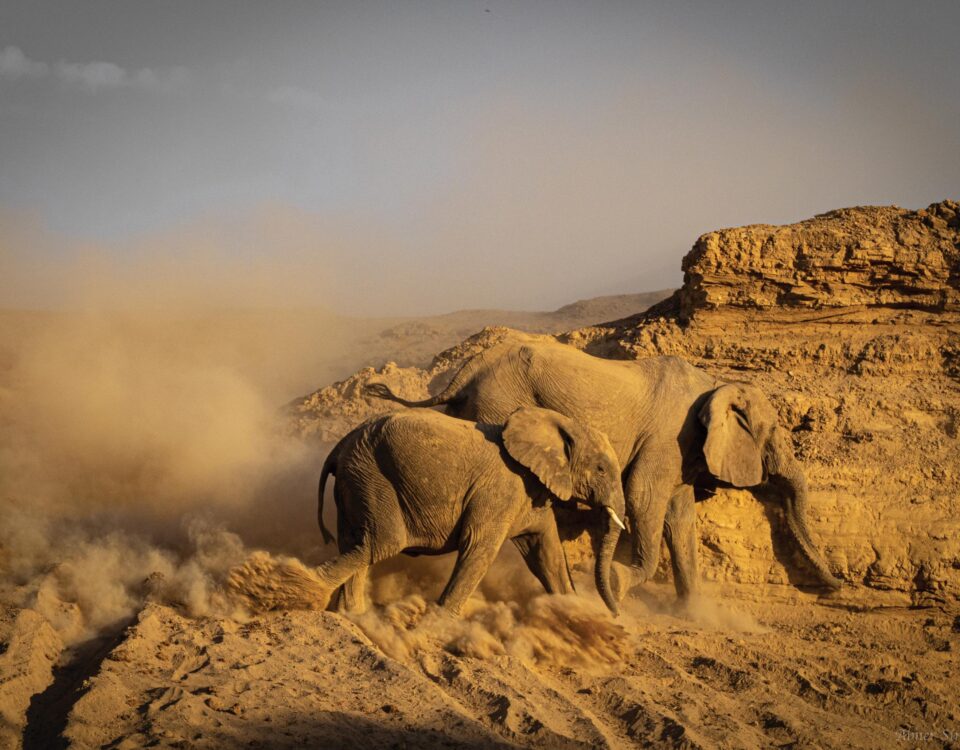Happy hens
January 6, 2014Whales, dolphins & birds abound!
January 10, 2014Text Ron Swilling
A colourful and rich display of weaving lines the showroom walls of the Karakulia workshop in Swakopmund. In a series of sand dunes with abstract geometric designs repeating themselves in soft and subtle hues, gemsbok, elephants and birds have skilfully been woven into woollen masterpieces.
Turning the corner into the workshop, the visitor feels transported back to the days of quality hand-made craftsmanship when items were made with time and care. A man sits spinning the raw karakul wool against the backdrop mural depicting karakul sheep, with bundles of colourful wool hanging from racks or lying in baskets waiting to be used, while a score of weavers create their designs for sending across the globe to enliven people’s homes.
I’m told by owner, Moses Helao, as he pages through an album with photos of Jack Russells, European lakes, beloved homes, favourite designs and company emblems, that the weavers at Karakulia can weave anything the client wants, including an image of the family dog. And, as I soon see, they certainly can. However, it is the striking Namibian scenes that convey the character of the country so well that are most popular with tourists.
Karakulia Weavers has been around for three decades, and some of the existing staff members have been with the company for all this time. Moses conveys its interesting history and his part in it.
Established in 1979 by Jenny Carvill as a hobby and to create employment in the area, the business started with one weaver, and expanded over the years. When Moses joined as a cleaner in 1991, Karakulia had grown substantially, employing as many as 50 staff members. Moses kept his eyes and ears open and learnt from his colleagues about the designs, patterns and weaving world. After a few years, he was promoted to assistant designer, then designer, assistant supervisor, then supervisor, assistant manager and finally – manager.
In 2006, Jenny retired. According to Moses she will be remembered as ‘an angel’ by her staff for her positive contribution to their lives and the Swakopmund community. The new owners soon had to deal with the worldwide recession and were forced to close their doors four years later. Just before it shut down, Moses visited the workshop one Saturday morning with his eight-year-old son.
Aware of his imminent unemployment, Moses had spoken to his family about conserving food and electricity at home. So, when his ever-inquisitive son saw that the morning’s sale had brought in a hefty sum, he was elated, thinking that the money would see them through the rough times ahead. Moses had to quickly explain to his son that this wasn’t the case and that after the basic expenses and salaries had been paid, there just wouldn’t be enough left to keep the business running. His son’s challenging words, “You can be your own boss, you know,” remained with him.
They say the words ‘from the mouth of babes’ tend to hold the most truth, and his son’s words remained in his mind until one day he submitted a business proposal to the Development Bank in Windhoek to re-open the weaving workshop on a smaller scale. Three months later, the business was inspected and although the bank acknowledged that it was a good project, it declined the proposal on the grounds of the venture being too risky. But Moses wasn’t prepared to give up that easily, and applied again.
The second time around he was successful. “I was on the moon that day,” he says smiling. With only N$150 left in his bank account and no capital to start the business, he knew he had quite a journey ahead.
People recognised his honesty and supported him, and at the end of their first month, in April 2011, Moses recounts proudly, he was able to pay his three staff members. His team has grown to 15 in the subsequent two years, but the challenge of keeping the bills paid has sometimes been a fine balancing act. With support from the Ministry of Trade and Industry, Moses has been able to showcase Karakulia’s quality products at an international trade fair and improve his business skills.
His efforts haven’t gone unnoticed and Karakulia was awarded the Good Business Award by the Development Bank in the SME category in 2012, the Silver Award for the SME Manufacturer of the year from the Namibia Manufacturer’s Association in 2013, as well as the SME award from Mineral, Mining and Energy.
Everyday challenges have kept Moses humble, and he recognises that humility, respect for the client and belief in oneself are characteristics essential for success. Visitors to Karakulia are welcome to walk through the workshop where all trials and tribulations of running a business are surpassed by the eye-catching weavings that can be purchased as wall hangings or as rugs and carpets – if you can bear to stand on them! Images are given life on looms: gemsbok materialise on Etosha savannah, a medley of dunes takes shape, and a bull elephant shakes his head, menacingly.
The workmanship involved in a single Karakulia weaving is clearly evident. The process begins with the large bundles of wool delivered from farms in the southern part of the country and the magic act is only complete after washing, dyeing, carding, spinning, designing and weaving. It’s a time-consuming handiwork, using age-old methods and wool sheared from sheep that have browsed the local vegetation and lived under African blue skies. It’s also an effective medium to depict quintessential Namibian scenes.
TNN Summer 2013 / 14







